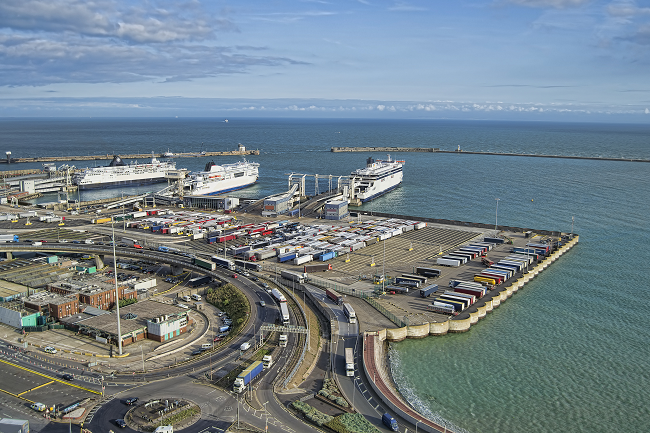
Peter Ward, CEO of UKWA (United Kingdom Warehousing Association), and Fellow of the IOE&IT, has warned that the port of Dover could face chaos if Rest of World (ROW) rules apply post Brexit to inspection of food imports from the EU.
Speaking to BBC News, Ward explained that there are no inspection facilities at Ro/Ro ports, such as Dover, nor the time or space to build any. This could result in unprecedented delays at the port, he said.
“Irrespective of the final form of Brexit – ‘no deal’, ‘hard’ Brexit or ‘soft’ Brexit – we expect an interruption in food supply chains. Market forces will mitigate the risk of delays by holding more stock closer to consumers in the UK, which may be good news for the warehousing industry in the long term, but from March 2019 there is simply not sufficient capacity nor the infrastructure to cope. This is not Project Fear, it is Project FACT!”
Ward argues that developing the necessary infrastructure will take years and considerable investment; to illustrate the point he accompanied Home Affairs Editor Mark Easton and the BBC film crew to see the Border Control Post at London Gateway port, a 200,000 sq ft multi-temperature state-of-the-art purpose-built facility with 22 loading doors and sufficient power to plug in hundreds of reefer containers.
“44% of what we eat comes into Dover from the EU, which is the equivalent of 1000 trucks per day through the port on ferries and the tunnel. If we are going to take real control of our borders, how this food going to be inspected consistent with ROW rules from March 2019 is critical, especially as port of Dover doesn’t have any such facilities as those at London Gateway, nor the necessary plug in points to power temperature-controlled vehicles,” he explains. “The only way to keep food cool while waiting for inspection will be to keep diesel engines running, costing more money and impacting badly on the environment.”
Although London Gateway was built for non-EU trade, as a container port it has been designed to meet the requirements of the future. Even so, Peter Ward emphasizes that there is no such thing as “frictionless trade” either at London Gateway or anywhere else.
Accordingly, on behalf of the industry, UKWA is calling for urgent action from government to recognize and respond to the challenges ahead.
“We are proposing that the government considers a change of legislation to allow food inspections at inland premises,” Peter Ward says. “Currently inspections must be conducted within the port boundary, but post-Brexit clearly this will be impractical. Such a change would bring opportunities for UKWA members and others to adapt existing premises to accommodate inspection facilities and bring online necessary capacity more quickly.”
He acknowledges that given the volumes involved, location of facilities would need to be close to both power supply and a sustainable labour pool, which in turn will trigger other concerns.
“The question is how the trade-off between national planning policy, devolved to local authorities, and resistance of local residents to large warehousing/distribution developments on the doorstep will be balanced against the need to ensure the nation continues to be fed?”
Ward adds that UKWA is consulting with government and providing feedback from members on all these issues, supplying the necessary detail to enable coherent and effective policy to be formulated going forward.
“UKWA is here to help government understand the perspective of the industry on the real impact Brexit is likely to have, particularly on food supply chains. Meantime, we are advising our members to prepare for a no deal Brexit and the 300,000 business that currently trade with the EU only to classify goods per UCC (Unified Customs Code), apply for deferment accounts and find partners and/or trade association that can help them prepare for the turbulent times ahead.”

